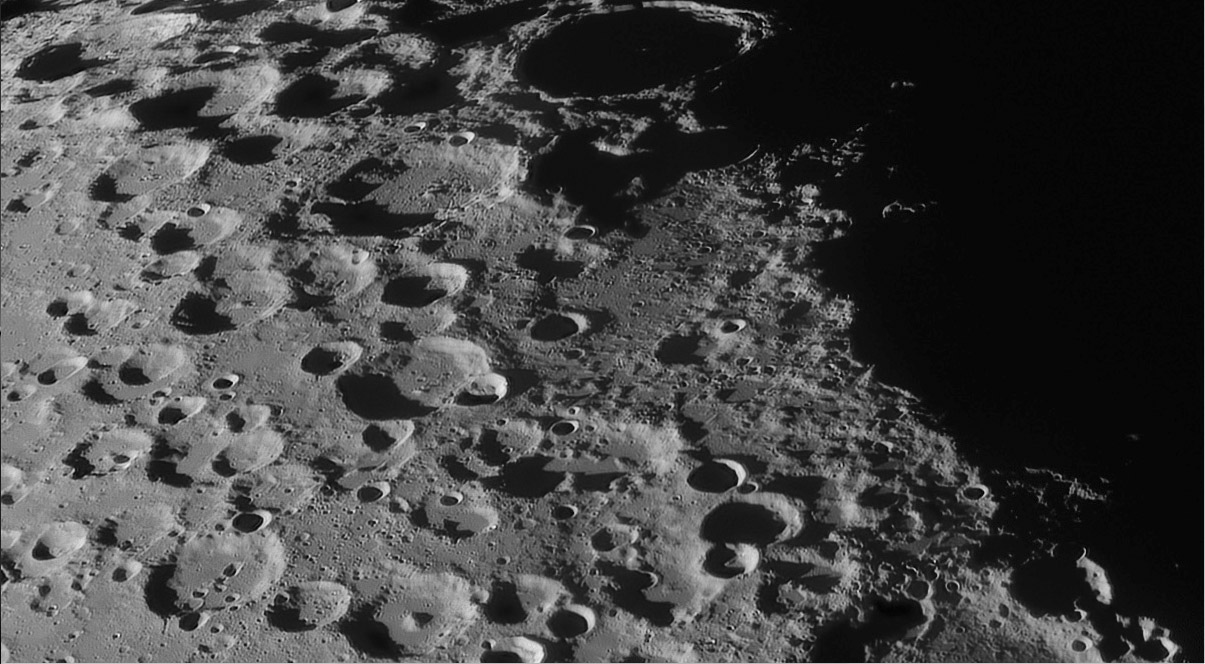Difference between revisions of "April 21, 2009"
| Line 6: | Line 6: | ||
<em>south up image by [mailto:astronominsk@mail.ru Yuri Goryachko, Mikhail Abgarian, Konstantin Morozov], Minsk, Belarus</em><br /> | <em>south up image by [mailto:astronominsk@mail.ru Yuri Goryachko, Mikhail Abgarian, Konstantin Morozov], Minsk, Belarus</em><br /> | ||
<br /> | <br /> | ||
| − | This is just a piece of a huge new [http://objectstyle.org/astronominsk/Moon/Moon2009/Moon_20090403_Maurolycus_en.htm mosaic] by the Minsk Miracle Imagers, but it is enough to reinvigorate the discussion of the origins of smooth plains | + | This is just a piece of a huge new [http://objectstyle.org/astronominsk/Moon/Moon2009/Moon_20090403_Maurolycus_en.htm mosaic] by the Minsk Miracle Imagers, but it is enough to reinvigorate the discussion of the origins of smooth plains |
| − | in the highlands. Just in from the terminator on the bottom right side of the image there is strong contrast between the small craters and hillocks that are | + | in the highlands. Just in from the terminator on the bottom right side of the image there is strong contrast between the small craters and hillocks that are |
| − | almost everywhere and the very smooth material on the floors of some craters. To discuss these ponds we need to agree on what is visible here - at the | + | almost everywhere and the very smooth material on the floors of some craters. To discuss these ponds we need to agree on what is visible here - at the |
| − | top center, the large bright rim on the terminator is Moretus, and the eastern rim of Clavius is at center right. The smooth material on crater floors and | + | top center, the large bright rim on the terminator is Moretus, and the eastern rim of Clavius is at center right. The smooth material on crater floors and |
| − | between craters is most visible to the left and bottom left of Clavius. The standard interpretation is that this material is ejecta from the formation of the | + | between craters is most visible to the left and bottom left of Clavius. The standard interpretation is that this material is ejecta from the formation of the |
| − | Orientale Basin. Seventy-cm radar images document that ejecta does travel this far, and in fact, made [http://lpod.wikispaces.com/April+30%2C+2008 me] think that that is what the smooth material | + | Orientale Basin. Seventy-cm radar images document that ejecta does travel this far, and in fact, made [http://lpod.wikispaces.com/April+30%2C+2008 me] think that that is what the smooth material |
| − | probably is. But the Minsk image reminds me of how localized and discontinuous the smooth plains are. I would think that the smooth-flowing ejecta should | + | probably is. But the Minsk image reminds me of how localized and discontinuous the smooth plains are. I would think that the smooth-flowing ejecta should |
| − | be more widespread and continuous. But if the smooth stuff is some sort of volcanism there are no apparent vents anywhere. I don't see compelling evidence | + | be more widespread and continuous. But if the smooth stuff is some sort of volcanism there are no apparent vents anywhere. I don't see compelling evidence |
| − | for either interpretation. | + | for either interpretation. |
<br /> | <br /> | ||
<em>[mailto:tychocrater@yahoo.com Chuck Wood]</em><br /> | <em>[mailto:tychocrater@yahoo.com Chuck Wood]</em><br /> | ||
| Line 25: | Line 25: | ||
[http://objectstyle.org/astronominsk/index_en.htm Minsk Miracle Imagers website]<br /> | [http://objectstyle.org/astronominsk/index_en.htm Minsk Miracle Imagers website]<br /> | ||
<br /> | <br /> | ||
| + | <hr /> | ||
<p><b>Yesterday's LPOD:</b> [[April 20, 2009|Why not Venus?]] </p> | <p><b>Yesterday's LPOD:</b> [[April 20, 2009|Why not Venus?]] </p> | ||
<p><b>Tomorrow's LPOD:</b> [[April 22, 2009|The Kiss of Fire]] </p> | <p><b>Tomorrow's LPOD:</b> [[April 22, 2009|The Kiss of Fire]] </p> | ||
| − | < | + | <!-- End of content --> |
{{wiki/ArticleFooter}} | {{wiki/ArticleFooter}} | ||
Revision as of 17:37, 28 February 2015
Just a Piece

south up image by Yuri Goryachko, Mikhail Abgarian, Konstantin Morozov, Minsk, Belarus
This is just a piece of a huge new mosaic by the Minsk Miracle Imagers, but it is enough to reinvigorate the discussion of the origins of smooth plains
in the highlands. Just in from the terminator on the bottom right side of the image there is strong contrast between the small craters and hillocks that are
almost everywhere and the very smooth material on the floors of some craters. To discuss these ponds we need to agree on what is visible here - at the
top center, the large bright rim on the terminator is Moretus, and the eastern rim of Clavius is at center right. The smooth material on crater floors and
between craters is most visible to the left and bottom left of Clavius. The standard interpretation is that this material is ejecta from the formation of the
Orientale Basin. Seventy-cm radar images document that ejecta does travel this far, and in fact, made me think that that is what the smooth material
probably is. But the Minsk image reminds me of how localized and discontinuous the smooth plains are. I would think that the smooth-flowing ejecta should
be more widespread and continuous. But if the smooth stuff is some sort of volcanism there are no apparent vents anywhere. I don't see compelling evidence
for either interpretation.
Chuck Wood
Technical Details
April 3, 2009, 15:35 UT. 230 mm Mak-Cass, F=3000 + 2X barlow + Unibrain Fire-i 702 CCD camera (IEEE-1394, 1388x1040, 18 fps) + Astronim red filter. Processing in Registax, Avistack and Maxim DL.
Related Links
Rükl plate 73
Minsk Miracle Imagers website
Yesterday's LPOD: Why not Venus?
Tomorrow's LPOD: The Kiss of Fire
COMMENTS?
Register, Log in, and join in the comments.



